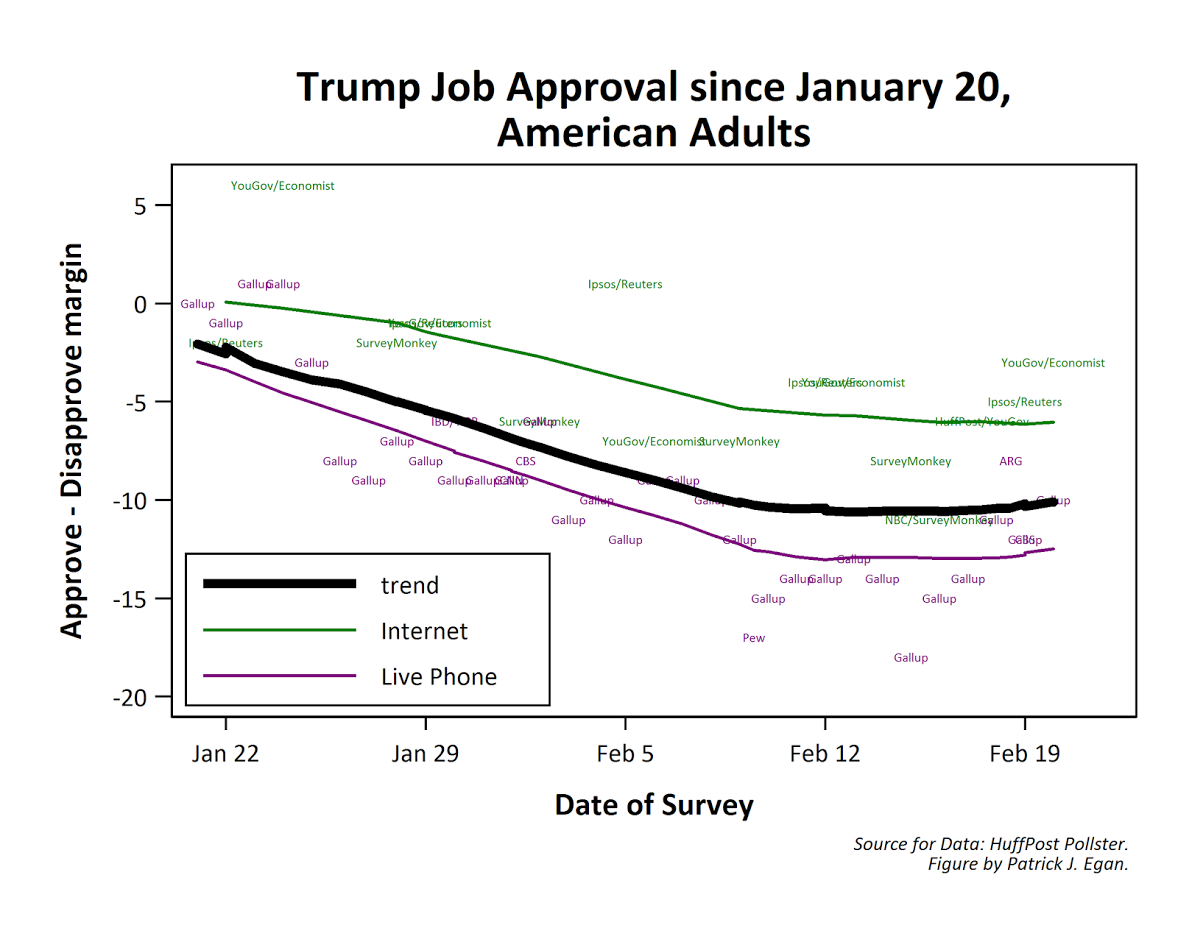It’s possible that Trump is operating close to his ceiling right now—and it’s a very low ceiling.
By Seth Masket
Donald Trump pauses during a campaign event on September 6th, 2016, in Virginia Beach, Virginia. (Photo: Alex Wong/Getty Images)
As has been reported extensively, Donald Trump’s job approval ratings started low relative to other new presidents and have declined ever since. Yet, as Patrick Egan has noted, those ratings seem to have stabilized over the past few weeks, with an average approval rating around 43 percent. Has Trump found his floor? His ceiling? What does this mean?
There are a few ways to think about this. First, it’s worth noting that Barack Obama’s approval ratings were in the mid-40s for most of his presidency. They didn’t start there, of course — he was in the low 60s at this point in his first term — and his approval went up considerably during his last year in office. But we should keep in mind that the economy was expanding, the crime rate was dropping, and the United States was at relative peace with other nations for most of Obama’s presidency. Those are conditions most presidents would pay a high price for, and yet they didn’t seem to benefit Obama much politically until the very end.
Why? To a large extent, it’s because we’re living in a very polarized era. Partisans tend to view new political information in a way that’s advantageous for the party they like and disadvantageous for the party they don’t like. Obama had the approval of 81 percent of Democrats even in 2010, when the Democrats got shellacked in the mid-term elections. He had 13 percent approval among Republicans that year. Trump right now has the support of 87 percent of Republicans and 8 percent of Democrats.

This suggests that, in such a polarized era, it’s hard to do a whole lot worse than 40 percent, and it’s hard to do a whole lot better than 50 percent. Your party will support you, the other party will oppose you, and it’s really just a matter of independents moving around.
But that’s not really the whole story. George W. Bush also governed during a very polarized era, and he managed to have approval highs near 90 percent and lows near 20 percent. The difference there was that the fundamental conditions of the country, which were relatively calm during Obama’s presidency, really did rocket back and forth under Bush. His highs came right after the 9/11 attacks (even Democrats were willing to rally behind him for a while), and his lows came during a recession and a prolonged war with Iraq (when even Republicans began to abandon him). It takes a lot to shake partisans, but it does happen.
Part of what’s driven Democrats and independents away from Trump so quickly is Trump’s own behavior. He hasn’t made any of the bipartisan overtures new presidents typically make, and he seems to have gone out of his way to anger and alienate people who weren’t part of his electoral coalition. That behavior really isn’t alienating many Republicans, 90 percent of whom voted for him after more than a year of similar behavior. But it’s likely suppressing his support. It’s worth recalling that his election odds improved in early November of last year at the time he went relatively quiet on Twitter.
But it’s also quite possible that Trump is operating close to his ceiling right now. With each passing week, he is given greater credit or blame for the fundamental conditions of the country. And given that economic growth has been strong so far this year, inflation and gas prices remain low, we’re not at war, crime remains low, etc., and he’s still in the 40s, it’s unlikely things will get a whole lot better for him. It’s certainly possible a 9/11-like tragedy could induce a rally effect for Trump, but it’s not obvious that it would.
Should those fundamental conditions shift toward the worse — and keep in mind it’s been roughly a decade since the U.S. last experienced a recession — some Republicans would likely abandon Trump. And given how few Democrats and independents are with him, we could see his ratings quickly plummet.
In the meantime, there’s good reason to think his popularity will stay roughly as it is. Americans have a pretty good idea how Trump behaves and governs at this point. Those who are approving of the job he’s doing aren’t doing so out of ignorance — they like it this way.




